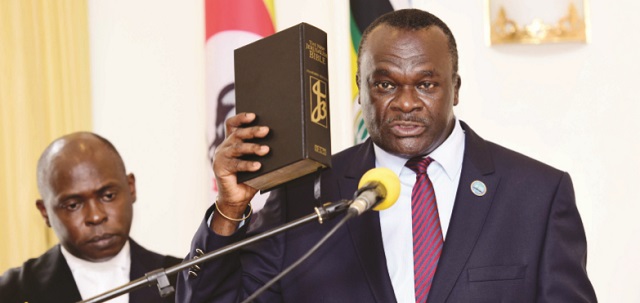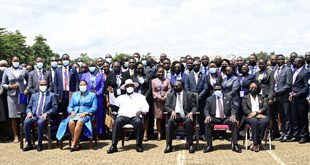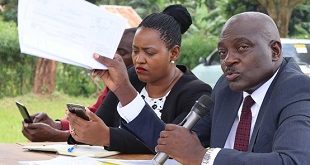
Kampala, Uganda | THE INDEPENDENT | The Deputy Chief Justice Alfonse Owiny-Dollo has revealed that he acquitted a suspect in the July 11, 2010 twin bombings in Kampala because one country declined to cooperate with Uganda in investigations.
While speaking at the Joan Kagezi Memorial lecture in Kampala on Friday, Justice Owiny-Dollo however stopped short of naming the suspect and the country that was uncooperative. The lecture was in memory of State Prosecutor Joan Kagezi who was shot dead in March 2015. At the time of her death, Kagezi was prosecuting the terror suspects.
According to Owiny-Dollo who at the time was the head of the International Crimes Division of the High Court and also the presiding judge of the terrorism case against 13 suspects, a certain country refused to avail very important evidence that would have convicted the suspect.
“They said that they could not help Uganda because it has refused to repeal the death penalty from the law books. And just like that we failed to get evidence that could have convicted the suspect, ” the Deputy Chief Justice said.
A reliable source who was privy to the investigation and prosecution of the case told Uganda Radio Network that the suspect Justice Owiny-Dollo was referring was acquited of terrorism and murder charges even though investigators had said he had recieved money from what they called a known Al Shabaab source in the United Kingdom.
It is not clear if this is the country Justice Owiny-Dollo was referring to, but the UK is is known for opposing death penalty.
According to the deputy chief justice, the unnamed country refused to help with the evidence unless Uganda could commit not to issue the death penalty against the suspect.
“We wrote to them and asked for documents and details of the transactions between the two but they replied that they need to get a commitment from the president against issuing the death sentence. Obviously President Museveni refused, ” the source said.
On May 26, 2016, the Justice Owiny-Dollo convicted seven suspects for the July 2010 twin bombings and also exonorated five others. Those acquitted include Omar Awadh Omar, Dr Ismail Kalule, Abubakari Batematyo, Muhammed Suleiman Habib and Yahya Suleiman Mbuthia.
Omar Awadh Omar, a Kenyan of Somali origin is one of the suspects whose investigations was largely handled by the Kenya Police. Kenya sent a senior officer as a witness to help convict the suspect.
He was arrested at Malaba boarder on September 18, 2010 at the peak of the investigations by the then Deputy Director Crime Intelligence at the Criminal Investigations and Intelligence Directorate (CIID), a place he claimed to have been handcuffed, blindfolded and dropped by Kenyan police officers.
Until when he was acquitted, he had been in detention for six years facing charges of being a member of a terrorist organisation, three counts of terrorism, 76 counts of murder and 10 counts of attempted murder.
According to Kenyan police officer Superitendant of Police (SP) Paul Maingo, Omar Awadh Omar had been under the Kenyan Intelligence surveillance since 2009 when they received information that he was involved in recruiting for the Al Shabaab terror group as well as financing and coordinating their activities.
” In 2010, we got infornation of posible recruitment at his home in Kalamani. We carried out a search at his home and recovered military items such as uniforms, sleeping bags and boots. We also found 10 Kenyan passports bearing different names,” SP Maingo told court when he appeared to testify as a prosecution witness.
Justice Owiny-Dollo while reading his judgement expressed his reservations on the release of Awadh after he had been found in possession of all this things.
“I find it most surprising and utterly inexplicable, and defies all logic, that a person who is a known point-man for the Al Shabaab, as the prosecution claims Omar Awadh Omar to be, is found red-handed with military materials, and in questionable possession of a number of passports; but is not brought to book,” Justice Dollo said.
Awadh had earlier told Court that the Kenyan Government was witch-hunting him because of a research he had carried out for his organisation Muslims’ Human Rights Forum tittled “Exposing the abuse of rights by Kenyan government in conjuction with foreign government agencies like FBI.”
Even though he was released, this arrest marked the begining of trouble for Awadh. Kenya police was to later receive information that the suspect was receiving money from United Kingdom through Qarani Forex Bureau in Eastleigh, a Naurobi surburb.
When the manager of the forex bureau was interrogated, he revealed that a remitance of up to 35,000 US dollars had been sent to Awadh between November 2009 and June 2010.
The money was allegedly collected by Musa Dere, a wanted Al Shabaab member who had been introduced to the manager by Awadh.
It is the connection of Awadh to the crime that led to the arrest and prosecution of Dr Kalule.
Dr Kalule is alleged to have received money from Awadh which he gave to the Kayima brothers to carry out the July 2010 attack.
All these suspects were rearrested immediately after their acquittal and are currently facing fresh terrorism charges.
Dr Kalule was last week released on court bail but rearrested by operatives of the Joint Anti Terrorism Task Force immediately after.
 The Independent Uganda: You get the Truth we Pay the Price
The Independent Uganda: You get the Truth we Pay the Price


